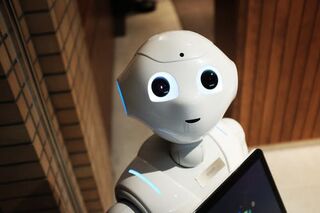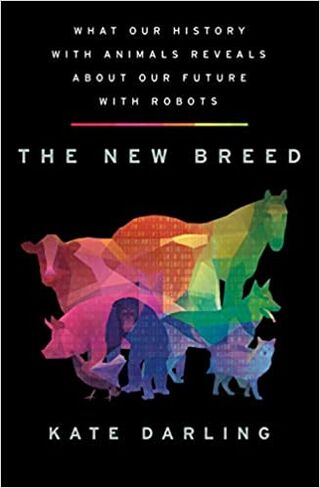Relationships
Can Human-Animal Relationships Inform Our Future with Robots?
Kate Darling argues that treating robots humanely will benefit us.
Posted April 18, 2021 Reviewed by Abigail Fagan
Key points
- The book "The New Breed" shows that moral inconsistencies in how people relate to nonhumans could predict how we will relate to robots.
- Treating robots more like the way we treat other animals will lead to the possibility of creating a productive partnership.
- Many people form deep emotional connections with robots and this likely will grow in the future.
Globally, there's a good deal of interest in the studies of the diverse nature of human-nonhuman animal (animal) relationships. Anthrozoologists, conservation psychologists, people working in the transdisciplinary area of animal studies, and non-academics are eager to know more about the complicated, confusing, and hypocritical relationships we form with other animals.1
My own interests in human-animal relationships was part of the reason I was keenly interested in a new book by MIT Media Lab's expert in robot ethics, Dr. Kate Darling, called The New Breed: What Our History with Animals Reveals about Our Future with Robots.2,3 Her landmark book made me think about what our relationships with nonhumans say about how we will interact with aliens.

As I read and reread different sections of this book, I found myself doing what I assume Kate wanted readers to do—namely, pondering the ways in which human-animal interactions have evolved over time and to personalize these reflections and think about how we will interact with robots that—some might say who if some robots are thought to be sentient beings—will become increasingly prevalent in the very near future.
She notes that our moral inconsistencies in how we relate to nonhumans "could be the single biggest predictor of how we will relate to robots in the future—whether they have any feelings or not." I found myself spending a lot of time thinking about sentient robots and discovered I'm not alone in these musings. Here's what Kate had to say about her deeply thoughtful book.
Why did you write The New Breed?
We live in an era of headlines like “No Jobs? Blame the Robots!” In so much of my work (and personal life) I encounter the worry that robots are coming to replace our teachers, therapists, and romantic partners. It struck me that too many of our conversations about robots and AI subconsciously compare these technologies to humans
I understand why—we have these machines coming into our workplaces and homes that can think, make autonomous decisions, and learn, so of course we compare robots to people and artificial intelligence to human intelligence. But robots aren’t like people at all. They don’t sense the world or think like humans do. This comparison limits us, and lends itself to a false determinism about how we can, will, and should be using robots.

Fortunately, even though robots can learn and make their own decisions, they aren’t the first autonomous nonhumans we’ve dealt with. Throughout history, we’ve used animals for work, weaponry, and companionship. We’ve partnered with animals not because they do what we do, but because they have a diverse set of skills and intelligence that is useful and supplemental to ours.
When it comes to robots, instead of recreating ourselves, our goal should be to create something different: a partner in what we’re trying to achieve. I wrote this book because it became clear to me that the animal comparison can change a lot of our current conversations (sometimes in surprising ways!), and open our minds to a broader set of possibilities for our robotic future.
How does your book relate to your background and general areas of interest?
Well, I’ve always loved robots, so that explains a lot. But the book ties together my knowledge from a few different areas: I have a legal and social sciences background, and have been working in robotics and human-robot interaction for over a decade. My interest has always been in thinking about the societal effects of systems and how they shape human behavior. And, of course, this book let me explore another interest I’ve harbored since taking extracurricular classes in college: animals!
What would you say to people who ridicule the idea that we can and will have feelings for robots?
Science disagrees with you. From everything we've seen, humans have an inherent tendency to anthropomorphize robots, similar to how we anthropomorphize animals. And, like with animals, we relate to some robots more than others, from soldiers to retirees to children. People's interactions with the primitive technology we have today are already proving that we're capable of deep emotional connections with the autonomous machines in our lives.
This isn't likely to fade as we move into the future. In fact, it will behoove us to take an approach that doesn't try to squelch this tendency, but rather acknowledges it.
What are some of the topics and major messages you cover in the book?
The New Breed reframes the conversation around how to best design, integrate, and think about robotic technology. Much ink has been devoted to discussions of how robots will replace our jobs and even our social relationships. But I argue that this view comes from our default of comparing robots to humans. If we become more aware of this subconscious assumption and instead look at our history with nonhuman animals, we see a very different possible future.
Some of the topics I cover in the book are the ways that artificial intelligence can differ from our own, examples of how we’ve used animals to supplement our skillsets and relationships, how we’ve dealt with the question of responsibility for harm when an animal does something unexpected, why we subconsciously treat robots more like living things than toasters, and, finally, our moral and ethical consideration of nonhumans.
I find that we have a lot to learn from birds and beasts, and, in a surprising twist, that robots also teach us more about our relationship to animals. This technology is a mirror that is beginning to reveal what we, as humans, care most about, and how we might be better towards our fellow creatures.
How does your book differ from others that are concerned with some of the same topics?
The New Breed tries to bring a fresh perspective and framework to the ongoing conversation around robots and AI. I’ve always enjoyed thinking outside of the box in this area, and, unlike most of the mainstream writing on the topic, my book is neither tech-utopian nor dystopian. Instead, I try to be clear-eyed about our challenges while mapping out a path to a more positive future.
References
Dr. Darling notes that our biggest hypocrisy is meat. (pp. 199ff)
Bekoff, Marc. What Animals Reveal About Aliens and Ourselves.
_____. Animal Dreams: How Humans Think and Write About Animals.
_____. Minding Animals and Sentience in the Old and New Worlds.
Bongard, Joshua and Michael Levin. Living Things Are Not (20th Century) Machines: Updating Mechanism Metaphors in Light of the Modern Science of Machine Behavior. Frontiers in Ecology and Evolution, 2021.




